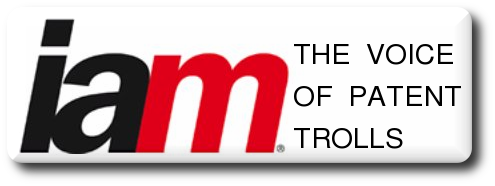

WE belong to a camp of patent realists or patent pragmatists (those insisting on patent reason or sane balance), as opposed to patent maximalists, who are typically those who just profit from patents without doing anything (other than lawsuits, paperwork and so on). It's saddening to see that IAM has dragged the EPO down to its level as IAM is funded by some of the most vicious players out there. It's like their spokesman. The following (below) are three example of 'news' from yesterday alone. 100% of what IAM published yesterday was pro-trolls drivel. This is also entered into Google News as "news", despite the agenda-driving nature of it (not journalism).
"This is also entered into Google News as "news", despite the agenda-driving nature of it (not journalism)."IAM's Editor in Chief, Joff Wild, conveniently calls patent realism "anti-patent" and conflates logic with antagonism. Paid by patent trolls (and even the EPO's PR firm), i.e. paid NOT to understand reality as it is, IAM says that "[t]he US Supreme Court is due to hear oral arguments today (Monday) in the much-anticipated TC Heartland LLC v Kraft Foods Group Brands LLC case. At issue is the extent to which a patent owner should be able to select the forum in which to file suit against an alleged infringer. Currently, plaintiffs have relatively wide discretion, meaning that over 40% of all cases end up in the Eastern District of Texas."
It's not hard to guess whose side IAM is taking. Just follow the money. IAM is a business and customers are not just readers.
"It's not hard to guess whose side IAM is taking. Just follow the money."In another new article, Wild refers to a patent troll (by proxy, e.g. Openwave and newer pseudonyms through which it preys on India, China, and even Europe) as "generous" and "smart" because it mentioned how much it charges companies ('protection' money). To quote: "We have received an overview of the Ericsson strategy from Eric Stasik of Swedish consulting firm Avvika AB. He sees the recent announcement as being part of a smart approach to 5G by Ericsson that may be a lot less generous and pioneering than people such as yours truly initially thought. It’s this kind of in-depth scrutiny that transparency delivers, of course."
This doesn't even account for the trolls Ericsson AB is sending to sue companies all around the world, e.g. Unwired Planet Inc.
"This doesn't even account for the trolls Ericsson AB is sending to sue companies all around the world, e.g. Unwired Planet Inc."Wild's colleague meanwhile writes about India, where software patents are banned. IAM ran a long series of silly posts earlier this year (e.g. [1, 2, 3]), wherein it attempted to shamelessly shame India for having such a rational policy. Yesterday IAM wrote about "India’s largest patent filer", noting that "episode demonstrates the folly of patenting... “expensive mistake” paid for by taxpayers..."
Why? Because this hoarder of patents has just imploded, which is good news. To quote: "Predictably, the press has made the connection between CSIR-Tech’s shutdown and Ghani’s comments and concluded that this episode demonstrates the folly of patenting. But while CSIR’s patent and licensing efforts to this point may well have been an “expensive mistake” paid for by taxpayers, the mistake is not seeking to commercialise publicly-funded research, as two authors in The Hindu argue. Plenty of institutions like the aforementioned Imperial Innovations do that very successfully. What these institutions don't do is hand money to any researcher who wants to file a patent, and then turn around and expect their tech transfer office to turn a profit with whatever assets come through the pipeline. More than anything, this story is a reminder that patents are not a great investment if they’re not conceived from the very beginning as a means to create business value."
"That's relieving news to the many Indian companies which are highly focused on productivity (coding for instance), not bureaucracy."Put another way, India is not fertile ground for patent trolls. One needs to actually create something, not just amass patents. That's relieving news to the many Indian companies which are highly focused on productivity (coding for instance), not bureaucracy. Well done, India! If IAM hates you, then you must be doing something right! ⬆